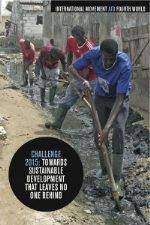Social Watch E-Newsletter - Issue 203 - February 20, 2015
Published on Fri, 2015-02-20 17:36
 |
| Issue 203 - February 20, 2015 |
|
|
|
| |
| |
|
| |
What counts and what can be counted in the SDGs
|
| |
|
| |
On February 18th a mid-day side event: “Robust and Measurable SDGs: Launch of report on scientific review of targets for the Sustainable Development Goals-the science perspective” was organized by the International Council for Science (ICSU) in partnership with the International Social Science Council (ISSC). The authors included forty-one people from the natural and social sciences in 21 countries and the event hosted a platform of 5 women contributors from different parts of the world presenting their particular angles on the document.
The 17 Sustainable Development Goals (SDGs) and their 169 targets were reviewed and the report focuses on a variety of issues ranging from the problem with targets, their double edged nature, the integration of goals and implementability as well as measurability and their links to appropriate country situations. It found that 29% of targets were well defined, that 54% needed more work, while 17% were weak or non essential. Read more.
|
| |
|
| |
|
| |
Applicability of the principle of Common But Differentiated Responsibility to the Financing for Development Agenda
|
| |
|
| |
 |
Jean Letitia Saldanha (CIDSE), participated in the a side-event by the Permanent Mission of Brazil to the UN, CIDSE and Social Watch on Thursday, January 29, 2015 in the UN Conference Building, New York. Dealing with responsibilities in a financing sustainable development context, this event generated discussion on conceptual challenges such as an evenhanded approach to the three pillars of sustainable development, adapting a framework like the Financing for Development process to the universal agenda of the Sustainable Development Goals without denaturalizing and decontextualizing it and how to incorporate important principles agreed at the UN Conference on Sustainable Development.
Saldanha said that the reason why this conversation is a pertinent one today is the recognition of the interlinkages between the various agendas that are being negotiated in parallel this year: finance, Post-2015 and climate. Morever, the UN General Assembly resolution on the organisation of the Third Financing for Development Conference emphasised that the Monterrey Consensus and Doha declaration provide the conceptual framework, including in the context of the Post-2015 development agenda for the mobilisation of resources for the achievement of sustainable development, and the need to ensure coherence, coordination and avoid duplication of efforts. Read more.
|
| |
|
| |
|
| |
Advocating in 2015 for a sustainable, gender just and human rights based development framework for the next decades |
| |
|
| |
 |
Feminist and women's organizations from the global south have conceived the United Nations as a critical space for recognizing and advancing progressive policies towards the realization of women's human rights and alternative development frameworks.
Twenty years ago, the Beijing Declaration and Platform for Action recognized the impact of globalization trends, structural adjustment programs and privatization in women's human rights and proposed measures that government should implement in order to revert these negative impacts. Among the recommendations, there was a strong recognition of the need to reform macroeconomic policies and development strategies to address gender inequality. Governments agreed to ensure that all corporations, the private sector, specially transnational corporations, “comply with national laws and codes, social security regulations, applicable international agreements, instruments and conventions, including those related to the environment, and other relevant laws, (para 165, l)”. Besides, new ways of generating additional public financial resources to tackle inequalities issues were considered, for instance, through the reduction “of excessive military expenditures” (para 143, b). Even if the Beijing Platform for Action (BPfA) was approved by governments in the context of the Washington Consensus, it has been a tool at the national and regional levels to promote policy change towards gender justice. Read more
|
| |
|
| |
|
| |
 |
International Movement ATD Fourth World presents the result of their participatory research on the Millennium Development Goals, Challenge 2015: Towards Sustainable Development that Leaves No One Behind, that brings the voices of people in poverty to the sustainable development debate. The result of years of participatory research with over 2,000 participants from over 20 countries, a majority of whom came from a background of poverty or extreme poverty, this report brings a unique voice to the global debate on international development.
The process of assessing the Millennium Development Goals (MDGs) was a unique opportunity to bring the voices of people in poverty to the forefront. This is why they launched their own participatory research project to assess the MDGs. Twelve of the countries in which we have an active presence were deeply involved in the project: Belgium, Bolivia, Brazil, Burkina Faso, France, Guatemala, Haiti, Madagascar, Mauritius, Peru, the Philippines and Poland. Read more
|
| |
|
|
|
| |
|
SOCIAL WATCH IS AN INTERNATIONAL NGO WATCHDOG NETWORK MONITORING POVERTY ERADICATION AND GENDER EQUALITY Social Watch >>
Social Watch E-Newsletter For comments, sugestions, collaborations contact us at: socwatch@socialwatch.orgTo stop receiving this newsletter send a message with the subject "unsubscribe" to: socwatch@socialwatch.org |
|
|
|
SUSCRIBE TO OUR NEWSLETTER
Submit
|
